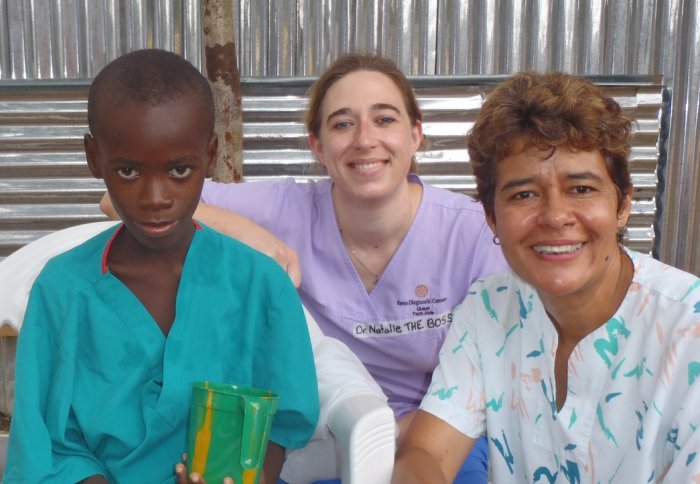"I can't forget the sight of a young boy, alone, with no-one to collect him"
by Kate Wighton

Dr Nathalie MacDermott (centre) outside Ebola clinic
Nearly 23,000 children have lost parents to Ebola in the crisis-hit countries, according to figures compiled by a doctor from Imperial College London.
Dr Nathalie MacDermott, a paediatrician and clinical research fellow from the Department of Medicine at Imperial, collated the figures from the countries most severely hit by the epidemic – Sierra Leone, Liberia and Guinea.
Dr MacDermott has worked extensively in Ebola treatment centres in Liberia, and witnessed first-hand the terrible challenges these children may now face.
In many areas in these countries, being an orphan with no one to look out for you can be very dangerous.
– Dr Nathalie MacDermott
Department of Medicine
She will present her findings at the launch of the Centre for International Child Health at Imperial. The centre, which is led by Professor Beate Kampmann and opening Friday, will be an umbrella organisation for Imperial researchers active in Global Child Health.
Dr MacDermott compiled the statistics with assistance from the UNICEF office in each country. The figures revealed there are approximately 22,858 children who lost one or both parents to Ebola.
“These children urgently need help and support,” says Dr MacDermott. “Although many were taken in by family or community members, there is a real risk that some of these children may struggle to attend school – as education is not free. They may also be subjected to child labour. In many areas in these countries, being an orphan with no one to look out for you can be very dangerous.”
One particular case that stays with Dr MacDermott is that of a 12-year-old boy, who she calls H to protect his identity.
But although the medical team knew he had family members from his adoptive family, no-one came to collect him.
“He was left sitting on step at the hospital, looking around for someone, but nobody came. There was simply no one to look after him. Not only had he lost his mother, and survived Ebola but he now was abandoned – and he was just one of thousands of cases.”
A staff member took him in and helped track down the youngster’s community, where he was left in the care of a community member, says Nathalie.
“I was desperate to know what happened to him, and spent most of the six months in Liberia trying to track him down, and find what happened to him – but I was never able to.”
Dr MacDermott also argues that in addition to helping the survivors from the epidemic, we also need to place children at the heart of research – to ensure we have effective medications to treat them.
“The mortality rate in children under one year olds from Ebola was close to 90 per cent. Yet many of the medicines were not tested in this age group for a variety of reasons.
“We need to think carefully about how we include children in research in epidemics, as this would help us ensure they get the best possible care in the future – and the greatest chance of survival.”
Article text (excluding photos or graphics) © Imperial College London.
Photos and graphics subject to third party copyright used with permission or © Imperial College London.
Reporter
Kate Wighton
Communications Division